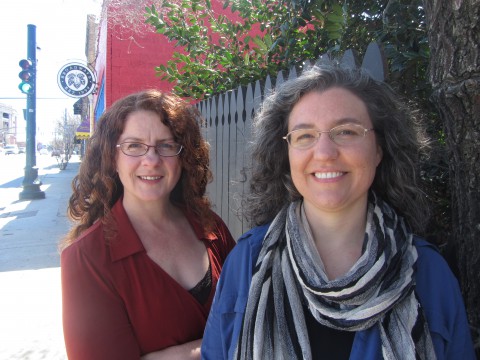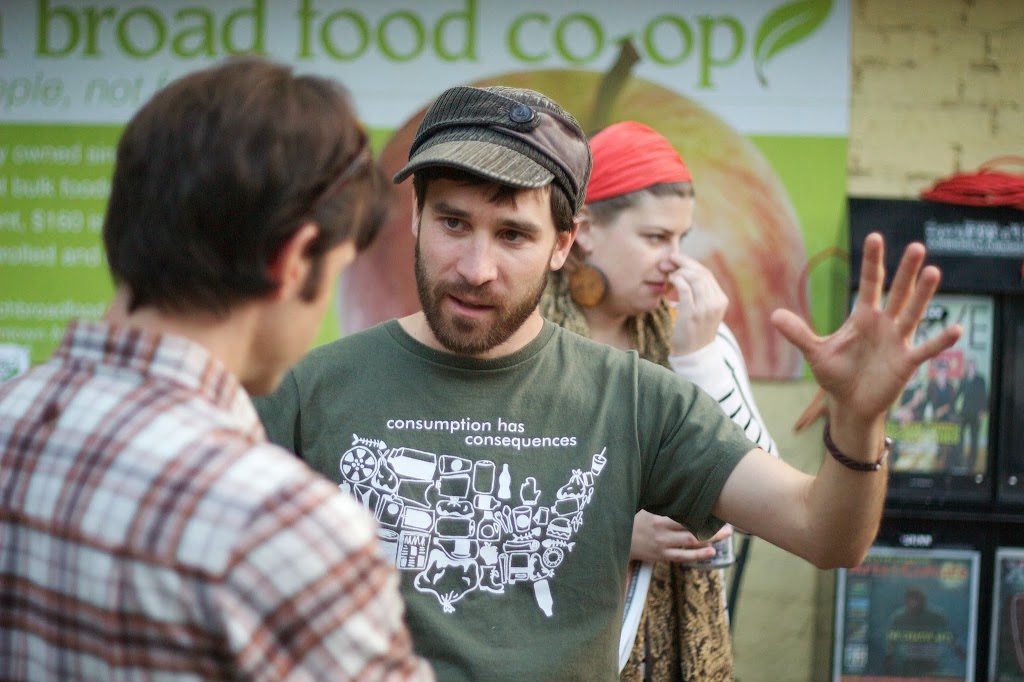“In Asheville, we have a lot of people who are what we would refer to as ‘lifestyle activists,’” says Tom Llewellyn, campaign organizer for the Dogwood Alliance and co-founder of the Asheville Tool Library and REAL Cooperative.
Lifestyle activism — everyday actions such as personal conservation efforts or conscientious purchasing choices — may be meaningful ways to shape our world, but in addition to making those day-to- day choices, many still yearn to find their voice and place in a world that feels increasingly loud and anonymous. So what can you do?
“It’s important to make those lifestyle choices, [but] it’s not enough: People need to show up,” Llewellyn says.
Show up for what? For Llewellyn and other activists, being a citizen is more than just maintaining a residence somewhere. “For those of us who have the privilege of being citizens, there’s a responsibility to shape the world we want to live in,” he adds. “It will not only position us as a sustainable culture, community or nation, but as a regenerative one.”
Dylan Ryals-Hamilton, of Transition Asheville, breaks down activism into three categories:
“The first is Holding Actions,” he says. “These are what most people think of when they think about activism.” Examples include protesting, blockading, putting oneself in front of a bulldozer, petitions and other efforts.
“The second is a kind of Consciousness Shift. [This] overflows into [all] areas of life, such as how we relate to each other as human beings and building social capital and strengthening communities,” Ryals-Hamilton continues. “Then there is Creating the New Paradigm, or building the world that we want to see.”
Within these, there are actions that aim to stifle or tear down existing systems and trends — focusing on what is broken — and those that seek to build new elements— nurturing what is healthy, Llewellyn says.
As to which is more effective in initiating change, “It’s really campaign- and issue- specific,” Llewellyn says “[Sometimes] you don’t have the luxury of putting your energy into the solution, [but] no matter what we’re doing, we always have to have the mindset of ‘what are the alternatives?’”
“One mistake that environmental activists as a whole have made for a very long time is ‘dooming and glooming’ people,” says Ryals-Hamilton, “And most people aren’t very receptive to that. [Activism] really should be fun.”
Balancing self-expression with service
When it comes to activism, Asheville’s arena of initiatives and nonprofits may be competing for resources and attention, rather than working together. When approaching activism in this city, it’s important to find a balance of self-expression and community service.
“We have almost an epidemic of visionary startup syndrome,” says Ryals-Hamilton, “We have a lot of people who are trying to start new projects and get things rolling from the ground up — reinventing the wheel in a lot of cases to create this thing that is their baby and possibly replicating something that’s already happening.
“For just about any major interest or issue, there’s probably [an initiative] out there, and I would advocate taking a look around [to] see what is already happening before initiating a new project,” he continues.
All the same, there are still a lot of niches to be filled, notes Llewellyn. Whether you’re lending yourself to an existing initiative or building up new systems and solutions, a common question for organizers is “How do I make my cause appeal to the widest possible scope of people in order to get them mobilized?” As Llewelyn mentions, “It’s the hardest thing to do, because everybody is coming from a different place.”
Some activists, however, suggest asking a different question: “How do I widen the scope and find a cause that mobilizes people?”
![Working together: Activist Dylan Ryals-Hamilton suggests the best results come through working together .“[Take] a look around and see what is already happening before initiating a new project,” he says. Photo by Jordan Foltz.](http://mountainx.com/wp-content/uploads/2014/04/activism01-480x360.jpg)
Meeting goals, dynamically
When a core group of individuals first began brainstorming to create what is now the Asheville-Buncombe Food Policy Council in fall 2011, they saw the importance of building a wide network to determine not only their goals but to define their purpose.
“We met with over 60 organizations just to say, ‘Hey, what would you say about collaborating on this?’” says Darcel Eddins, founder of Bountiful Cities and one of the original founders of ABFPC.
Before such outreach, Eddins notes, “[Bountiful Cities] was finding that [these organizations] were competing. So the goal was to collaborate as a network and move forward so that Asheville could be a food-resilient community.”
By the time of the first public convening in October 2011, each organization had done its own outreach, and more than 100 people showed up at UNC Asheville’s Sherrill Center.
“There were people from Hillcrest, there were gardeners, farmers, people from non- profits and also just a lot of citizens who were interested and concerned,” says Mary Lou Kemph, the facilitator of the ABFPC General Council.
By the end of the second convening in February 2012, the group had established its purpose and determined that “dynamic governance” would be its process for decision-making.
Dynamic Governance uses what Tracy Kunkler, founder of the Asheville-based Dynamic Governance Institute, describes as “ecosystem logic,” a process in which participating individuals can be fully self- expressed but also agree on common needs and common goals, working together for the whole, she explains. Kunkler describes this interconnectivity as “feedback loops.”
“Natural systems have feedback loops,” says Kunkler. “But if you look at a top-down hierarchy, it doesn’t have feedback loops. If you get that we are all deeply interconnected, you realize that if you’re missing a voice — or worse, if you’re plowing over somebody who has an objection — in the end you’re going to pay for that.”
Feedback loops facilitate clear communication between the “clusters” that comprise a given organization, Kunkler says.
“If the stomach is telling the brain that it does not consent to a particular food, but the brain overrides the feedback and con- sent of the stomach, then the whole body is going to suffer,” Kunkler says.
When decisions are made by way of debate and persuasion, she adds, the objective is to overcome diversity rather than embracing it, which is contrary to ecosystem logic.
Early adoption of a dynamic governance system can be beneficial even to a group that considers itself harmonious, says Michelle Smith, also of the Dynamic Governance Institute.
“One of the mistakes that groups make is not making any clear decision about the process they are going to use for making decisions,” says Smith. “They may say, ‘Well, we’re all good people, so we’ll be fine. But in fact a process will emerge and be adopted. If it’s not intentional, it will often be based on dominant voices and shadow-power dynamics.
“The implementation of those decisions is going to be choppy,” Smith continues. “There’s going to be more conflict, more debate, more disagreement, more criticism — instead of something that allows us to move forward together, getting the real perspectives from all different corners.”
For the Food Policy Council, it seems adopting the dynamic governance model has led to a resilient and sustainable organization and completion of the organization’s goals. Since its inception, Eddins and Kemph agree, the group has surpassed their expectations of accomplishment — including the adoption of its Food Action Plan by the Asheville City Council in February 2013.

Connection: the new activism
“Through the stories of the civil rights movement and before, we hear that the actions of a single individual changed the entire world and the course of history,” says Emma Hutchins, a local organizer who sits on the Access Cluster of the Food Policy Council. “While this perspective was likely intended to be empowering, it is actually disempowering to think that you can make change by yourself, because you can’t. People are starting to realize again that the secret to change is to organize with your community.”
It seems the folks on the front lines are not only forging new ways to accomplish effective initiatives but are the harbingers of a deeper fulfillment — one that fuses self-expression with collectivism, where making a mark isn’t as important as doing one’s part.
“What’s emerging now is the idea of collective impact,” says Kunkler. “If we’re going to make a change in this complex social system, it’s not going to be one organization, no matter how good they are.
“I’ve heard it said that connection is the new activism,” she continues. “It’s not about fighting for what you want: It’s actually about creating a new table for authentic citizen engagement.”
Ryals-Hamilton quotes from Transition Asheville founder Rob Hopkins: “If we wait for governments to act, it will be too little, too late. If we act as individuals, it will be too little. But if we act as community, then it might be just enough — just in time.”




Before you comment
The comments section is here to provide a platform for civil dialogue on the issues we face together as a local community. Xpress is committed to offering this platform for all voices, but when the tone of the discussion gets nasty or strays off topic, we believe many people choose not to participate. Xpress editors are determined to moderate comments to ensure a constructive interchange is maintained. All comments judged not to be in keeping with the spirit of civil discourse will be removed and repeat violators will be banned. See here for our terms of service. Thank you for being part of this effort to promote respectful discussion.